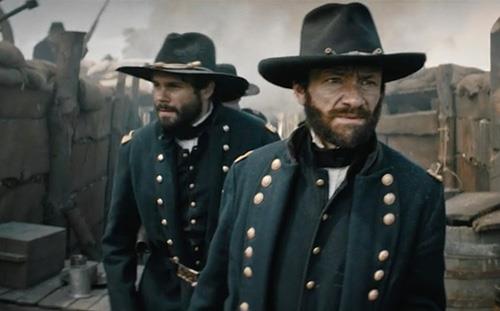
Restoring the reputation of Ulysses S. Grant may not sit high on your history priority list.
Even if it doesn’t, the three-night miniseries Grant, which premieres Monday at 9 p.m. ET on History, makes for a compelling watch and a surprisingly interesting story.
The producers, to be clear, have an agenda. They feel Grant’s reputation has been unjustly tarnished, or ignored, in the century and a half since he was president. Grant, therefore, joins several recent counterthrusts that aim to restore him to the esteem in which he was held for much of his lifetime.
The real-life Grant made his reputation as the general who finally won the Civil War for the North. He was a superb military strategist blessed with an ability to remain uncannily calm while a battle could be exploding all around him.
After the war, popular demand coerced him into running for president, which he really didn’t want to do. He served two terms, from 1869 to 1877, during which he pushed for what is known as Reconstruction. He hoped to put the United States back together by embracing former secessionist Southerners while paving the road to equal opportunity and treatment for the black members of society that many of those secessionists formerly held as slaves.
It was a noble effort probably doomed to failure. As the experts in Grant point out, it took almost another hundred years for some of the fundamental promises of freedom and equality to finally become law and policy.
As decades passed, Grant came to be blamed by both sides – by Southern whites for not respecting “states’ rights” and by progressives for not laying down a strong enough foundation for Reconstruction to continue after he left office. Which it did not.
Grant was accused, at various times and to different degrees, of being weak, corrupt, and drunk.
Grant counters by arguing that the anti-Reconstruction forces were too powerful to be stopped by one man, including the president, and that Grant did the best he could.
The series addresses the corruption charge by allowing that he was not always politically astute and, for most of his second term, unhappy to be there at all. This may have made him occasionally inattentive, it argues, but there is no evidence he took any actions for personal gain.
As told here, Grant is closer to a real-life Horatio Alger story, a kid from humble beginnings who worked his way to the top by being honest and competent.
After graduating from West Point, he acquitted himself well in the Mexican War before he got bored with military life and left to take a bunch of civilian jobs at which he wasn’t very successful.
He was lured back to the Army by the Civil War and got the attention of President Abraham Lincoln by turning a potentially catastrophic defeat at the battle of Shiloh into a victory in the summer of 1862.
He became one of Lincoln’s favorites, which, among other things, put him under pressure to help Lincoln get re-elected in 1864 by showing a war-weary public that the North was rolling to victory.
He did this with an aggressive strategy that left paths of destruction across the South – scars that historians recount here as triggering some of the sullying of his reputation after his death.
Grant acknowledges contradictions in Grant’s life. He came from an anti-slavery family and married into a family that held slaves. He did have the drinking problem with which his name is often associated, though it was more sporadic than chronic, and did not impair his focus on important decisions.
Whatever anyone thinks of Grant, or doesn’t, he remains a significant president and an even more significant military commander. That makes his reputation more important than that of other forgotten or disrespected presidents.
Accordingly, Grant sees its restoration mission as valuable, because how we feel about U.S. Grant ties into racial and social attitudes that remain determinants of American policy and action today.
Purely as television drama, Grant uses History’s standard tactic of employing relatively unknown actors to dramatize the lives of its subjects. For whatever reason, that works better here than it has in some other cases, and the narrative moves forward at a pace that will keep viewers’ attention.
One series is unlikely to create any sea change in something as cumulative as Grant’s reputation. Taken alongside other similar efforts, it could eventually help move the needle back.